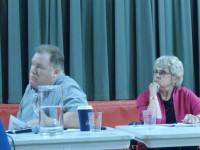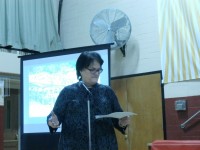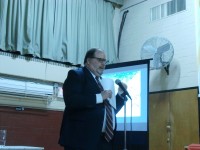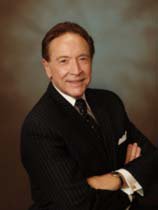Once Again, Brewster Property Owners Sound off on Urban Renewal Plan

In another opportunity for residents and property owners to speak up about Brewster’s proposed Urban Renewal Plan, village trustees heard a mouthful and once again, not much of it was supportive.
For the better part of the new year, the village board has heard a long list of complaints, concerns, and questions and that trend continued during the board’s public hearing about the Urban Renewal Plan Wednesday night. A sizable crowd showed up to the two-hour meeting at St. Lawrence O’ Toole Church to discuss the plan that village officials hope gives Brewster a much needed reboot.
Well-known resident Jack Gress slammed the plan and the possibility of eminent domain connected to urban renewal. Three of Gress’ properties and a portion of his affordable retirement community are in the Urban Renewal Plan zone and he said that if eminent domain is initiated, it could take away his property rights.

Rather than urban renewal, Gress would rather see the village put in place conditions to induce private investment, have owners rebuild what they can and encourage incentives to replace badly blighted properties. He also encouraged the board to stop meddling with free enterprise through regulation.
“I would like to see revitalization without urban renewal and remove the threat of eminent domain,” Gress said.
Resident and planning board member Rick Stockburger also railed against the plan, questioning costs to the village. He argued taxes would increase as the project went further to cover different improvements the village board wants to make like realigning streets and putting in more sidewalks.
With the lost tax base of pushed out business, tax abatements for new businesses, and various improvements, Stockburger argued this would raise taxes. Stockburger said additional housing would result in more school-age children attending Brewster schools, raising school taxes.
“We need to remember that there will be tax increases involved with all of this and the cost should be stated up front,” he said. “Nothing is free.”
Stockburger’s wife, Terry, a former trustee, said she would like the village board to make changes to Urban Renewal Plan draft. She’d like the lines redrawn to the immediate areas that would be changed and have a phased-in approach.
“Nothing prevents you to make changes,” she said.
Vince Ferrandino of Ferrandino & Associates, a planning and consulting firm representing 11 village property owners, listed off several criticism and suggestions to the board. He said the village wasn’t following proper procedure, the blight study is flawed, and there’s no reasoning for the five sub-areas. He stressed the only reason to adopt a Urban Renewal Plan was to have the option of eminent domain and questioned why a developer for the project signed a Memorandum of Understanding two years before the Comprehensive Plan was adopted.

“This Urban Renewal Plan appears to be entirely developer-driven, and ignores the voice of the village,” he said.
The attorney representing those 11 owners, Daniel Leary, asserted the village skirted planning and zoning laws and didn’t comply with General Municipal Law leading up to this point. He called the village board’s approach “heavy handed and draconian.”
“We strongly believe that moving ahead with the plan on the current path is fraught with risk and is legally untenable,” Leary said. “We believe that the Village of Brewster would have no choice but to start over with the process.”
Resident George Sohn said if the plan goes into action, it would really be gentrification that increases property values and pushes out lower income people.
“When I hear the words urban renewal, there are three words that come to my mind,” he said. “Disruption, dispossession and displacement.”
Resident Andrea Dunham, whose home is part of the blight study, said she had mixed emotions toward the plan. While she didn’t want to see anyone displaced, she also didn’t want to see progress in the village stalled.
The village has to do a better job at uniting all residents including the Spanish-speaking community that she felt was marginalized. She urged property owners to find ways to improve the village outsides of any Urban Renewal Plan.
“I desperately don’t want this (village) with beautiful water color drawings and pie in the sky ideas to forget the people who build and create a community,” she said. “Let’s get creative and let’s get out there and do something.”
One resident that spoke in support of the plan was Joe Lambert of Prospect Street, who said he “fully supports” the revitalization plan and a “vibrant downtown” is lacking Brewster.
He admitted any change, especially a big transformation, is difficult, but the village needs to progress even if certain individuals are affected by the outcome.
“If we had a food truck, a mime, and one-man band, that would be better than what we currently have in our downtown area,” Lambert said.
While some residents in attendance had previously spoken up for the plan, they didn’t formally speak this time.
Although most comments were subdued, near the end of the meeting resident Frank Marshall, whose home is part of the blight zone, butted heads with the board. He said trustees never answer specific questions with substantive answers.
“Everyone’s going to sue you to no end,” he said. “You know that’s going to happen.”
Trustee Christine Piccini said the village doesn’t want litigation because taxpayers would bear the costs. It was also debated whether Mayor Jim Schoenig ever said eminent domain would not be part of the process, as alleged by Marshall. Schoenig said he “never, ever” said that and instead said it would only be a last resort. (A past article in The Putnam Examiner backs up Schoenig’s statement.)
The village has works sessions set up (March 14,15,16) to review comments and questions from the hearing. More work sessions could be scheduled, Piccini said.
Piccini said, “We know there is a lot of work that needs to be done.”

